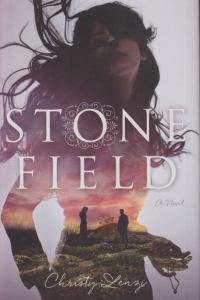 Young adult literature gives me hope.The quality, speaking for a guy who grew up in a small town with limited choices, has improved astronomically over the past several years.One of my favorite (adult) novels is Wuthering Heights, and so it’s no surprise that I found Christy Lenzi’s debut novel Stone Field quite engaging.Set in a different time and place, and with a younger readership in mind, it retells the story of forbidden love based on xenophobia.The message has never been more relevant.Although it avoids explicit language, it does include adult situations and features a strong female protagonist in an age of explicit gender inequality.During the chaos leading up to the Civil War, star-crossed lovers are set against one another because prejudice is a most effective poison.
Young adult literature gives me hope.The quality, speaking for a guy who grew up in a small town with limited choices, has improved astronomically over the past several years.One of my favorite (adult) novels is Wuthering Heights, and so it’s no surprise that I found Christy Lenzi’s debut novel Stone Field quite engaging.Set in a different time and place, and with a younger readership in mind, it retells the story of forbidden love based on xenophobia.The message has never been more relevant.Although it avoids explicit language, it does include adult situations and features a strong female protagonist in an age of explicit gender inequality.During the chaos leading up to the Civil War, star-crossed lovers are set against one another because prejudice is a most effective poison.
While not a religious story, the iconic Bible plays a large role in it.One of the main characters is a preacher, but even without him Catrina Dickinson’s family and friends are ready to quote the Good Book as unquestioningly as a Republican (with my apologies to fiscally conservative friends untainted by this aberration).This is beyond a realistic portrayal of American life of the 1860s, it reflects the way that many people continue to think of Scripture.Nevertheless, in one crucial episode of the story set in the church at Roubidoux, Missouri, the iconic role of the Bible becomes clear.It is deftly woven throughout the story in a way that might serve as a lesson for modern writers seeking verisimilitude.Many authors fear to address religion, but the Good Book is alive and well in these post-frontier days.
Often the desire to avoid religious motivations leads to stories that lack a key element of the social fabric.In my own attempts at fiction religion is seldom absent.It is the way average people live.Lenzi presents Cat as being aware of but unwilling to be cowed by the Bible.Indeed, as the story unfolds with several tragic events (remember, Wuthering Heights) she demonstrates that Catrina knows but doesn’t accept the strictures of Scripture.The issue of theodicy hangs heavily in the atmosphere of the novel.To me, this makes stories appear more life-like than tales that simply suppose religion doesn’t impact people.When tragedy strikes, many people question what God, or their stand-in for the divine, is doing.Anyone who’s asked “why me?” has directed that question into the world of theodicy, whether intentionally or not.Reading this story while going through a family illness may have drawn this to the surface, but it underscores just how effective it may be for a realism that is otherwise lacking, whether in fact or young adult fiction.
